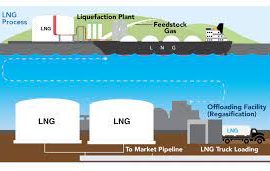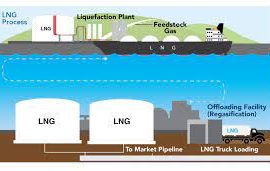
Russia invades Ukraine and oil and natural gas ore in danger. Will we end up selling more? Good question.
As the United States and Europe continue to pummel Russia with economic sanctions following Vladimir Putin’s military attacks on Ukraine, Louisiana’s heavy industrial sector is waiting in the wings to see what effect the penalties will have on the state’s booming liquefied natural gas market. The impact in Louisiana will hinge on a few key factors, industry experts say: whether the Nord Stream 2 pipeline from Russia to Germany will continue to be delayed; whether European buyers will eschew Russian resources for Louisiana’s supply; and whether federal agencies might limit LNG exports as part of President Joe Biden’s continued push to reduce the impacts of climate change. The outcomes are hard to predict in the sanctions’ infancy, particularly given that U.S. exporters of LNG are stretched to capacity in the near future. But experts contend Louisiana could be poised to see market gains should foreign demand for LNG ultimately increase over time. “Long-term, short-term, we wouldn’t know (the impact of the sanctions),” Louisiana Economic Development Secretary Don Pierson said. “But strategically, to be this powerful energy resource for the globe, we anticipate that there will be great market opportunities across Louisiana for the export of liquefied natural gas for decades to come.”
theadvocate
The main factor is the Nord Stream 2 pipeline from Russia to Germany.
A key piece of the sanctions is Germany’s move to block construction of the Nord Stream 2 pipeline, which would deliver natural gas from Russia to Germany across the Baltic Sea and supply other European nations. The move is pertinent here because both Russia and the U.S. are key suppliers of LNG to Europe. The U.S. provided 26% of all the LNG imports to European Union countries in 2021, compared to 20% by Russia, according to the Energy Information Administration. Of the United States’ six LNG export terminals, Sabine Pass in Cameron Parish easily had the greatest export output in 2021 at more than 1.24 trillion cubic feet, or more than one-third of all exports, according to EIA data. Cameron LNG, located in Hackberry, Louisiana, was fourth at more than 602 billion cubic feet.
We may end up exporting more war or not as more of the industry is looking to come here.
Of the United States’ six LNG export terminals, Sabine Pass in Cameron Parish easily had the greatest export output in 2021 at more than 1.24 trillion cubic feet, or more than one-third of all exports, according to EIA data. Cameron LNG, located in Hackberry, Louisiana, was fourth at more than 602 billion cubic feet. Even more LNG exporters are descending upon Louisiana. Venture Global has plans to build four LNG terminals in Louisiana, Tellurian Inc. will build Driftwood LNG in Calcasieu Parish, and Dallas-based Energy Transfer LP plans to convert its Lake Charles LNG import facility into an export facility. Despite the capacity, David Dismukes, executive director at the LSU Center for Energy Studies, said immediate gains for Louisiana’s LNG exporters could be limited because most terminals here have signed enough contracts to max out their near-term resources. Dismukes said the sanctions could be enough to motivate European buyers to rethink purchasing Russian LNG. But that’s assuming the sanctions hold long enough to let companies make long-term decisions, which don’t happen overnight. The Nord Stream 2 project could be revived at any time in the future, or it could even be scrapped permanently, depending on the next steps from the U.S. and Russia. “You’ve got to replace that gas with something. If you’re not building a pipeline, you have to bring it in on a ship. The U.S. would be the most likely source for that,” Dismukes said. “But it’s got to require somebody to put their name on a contract for an extended period of time.”
We are at full capacity now and it will take time to figure out how to supply Germany, who is increasing renewable energy production.
Mike Moncla, president of the Louisiana Oil and Gas Association, agreed that LNG exports are at full capacity both in Louisiana and nationwide. He said it’s hard to predict what foreign nations will do in terms of future energy purchases. “Hopefully this conflict with Russia and Ukraine is going to go away in the next several months and things can get back to normal and the world supply can kind of equal out,” Moncla said. “But who knows.” However, Dismukes said Louisiana’s chemical production sector could see immediate gains should crude oil prices remain high compared to natural gas. European chemical facilities tend to favor crude oil as a feedstock, while U.S. complexes rely on an abundance of cheap natural gas. As of Thursday morning, Brent crude oil was trading $105 a barrel and Henry Hub natural gas was at $4.63 per million British thermal units, or BTUs. “If crude prices stay high, that will give the U.S. an advantage for natural gas-based production,” he said.
The choice on LNG over oil as LNG has fewer emissions works in the favor of more to export from Louisiana.
Pierson called LNG a “tremendous opportunity” for Louisiana’s economy that falls in line with the state’s climate action plan, which deems natural gas as a “clean” source of energy that emits “little to zero” greenhouse gases. “As we try to move toward reduction in greenhouse gases — to move away from fossil fuels is the ideal scenario. However, that will be a transition,” Pierson said. “It will be a transition away from coal and other fuels that emit a lot more greenhouse gases than LNG. As we transition to a hydrogen-based fuel resource, LNG for decades to come will power countries around the world.” But even amid the simmering tensions between Ukraine, Russia and the U.S., the Biden administration has been under pressure from Democrats to limit LNG exports as energy prices have risen domestically. In early February, 10 Democratic senators wrote a letter to Energy Secretary Jennifer Granholm calling on her department to halt permit approvals for LNG facilities. In response, Republicans wrote their own letters saying restricting exports would negatively impact global LNG markets and would counter attempts to pivot foreign countries away from Russian energy sources. U.S. Rep. Garret Graves, R-Baton Rouge, and Republican Louisiana Sens. Bill Cassidy and John Kennedy signed the letters. On Feb. 17, the Federal Energy Regulatory Commission issued proposed new rules on natural gas projects, including LNG work. The policies call for greater assessments on the environmental impacts of new projects and limits their emissions threshold to 100,000 metric tons of greenhouse gases per year. Biden has also taken steps to halt oil and gas leases on federal lands and waters, including the Gulf of Mexico.
WE have an excess of LNG for our home grown needs so there is enough to send overseas.
Moncla said the U.S. has enough power sources at home to meet its domestic energy needs, including natural gas, so there’s plenty left to ship overseas. “The only reason that the federal government would suspend LNG would be just political views on natural gas being liquefied,” he said. “We have plenty enough gas to cover our needs in the United States. Why would we want to shut European nations and Asian nations out when we have plenty of natural gas liquefied to send them? If we stop doing that, we would have so much gas we wouldn’t know what to do with it.” Stephen Waguespack, president and CEO of the Louisiana Association of Business and Industry, said the White House should turns its focus immediately toward increasing domestic production. “This type of situation is exactly why the Biden administration should not have hindered through regulation our American energy production, because it makes us vulnerable in times of crisis,” Waguespack said in a statement. “Right now, we need to ramp up our domestic production, and we should start with those in the Gulf of Mexico because this area is ready to go. We should also approve pipelines and other infrastructure needed across the country to get our production back on track to service our own people.”
In short, the duration of the war and the decisions after it ends will be the driving forces. We have the ability and the means to send LNG overseas and with the cut off of supplies from Russia we may be called into action.



